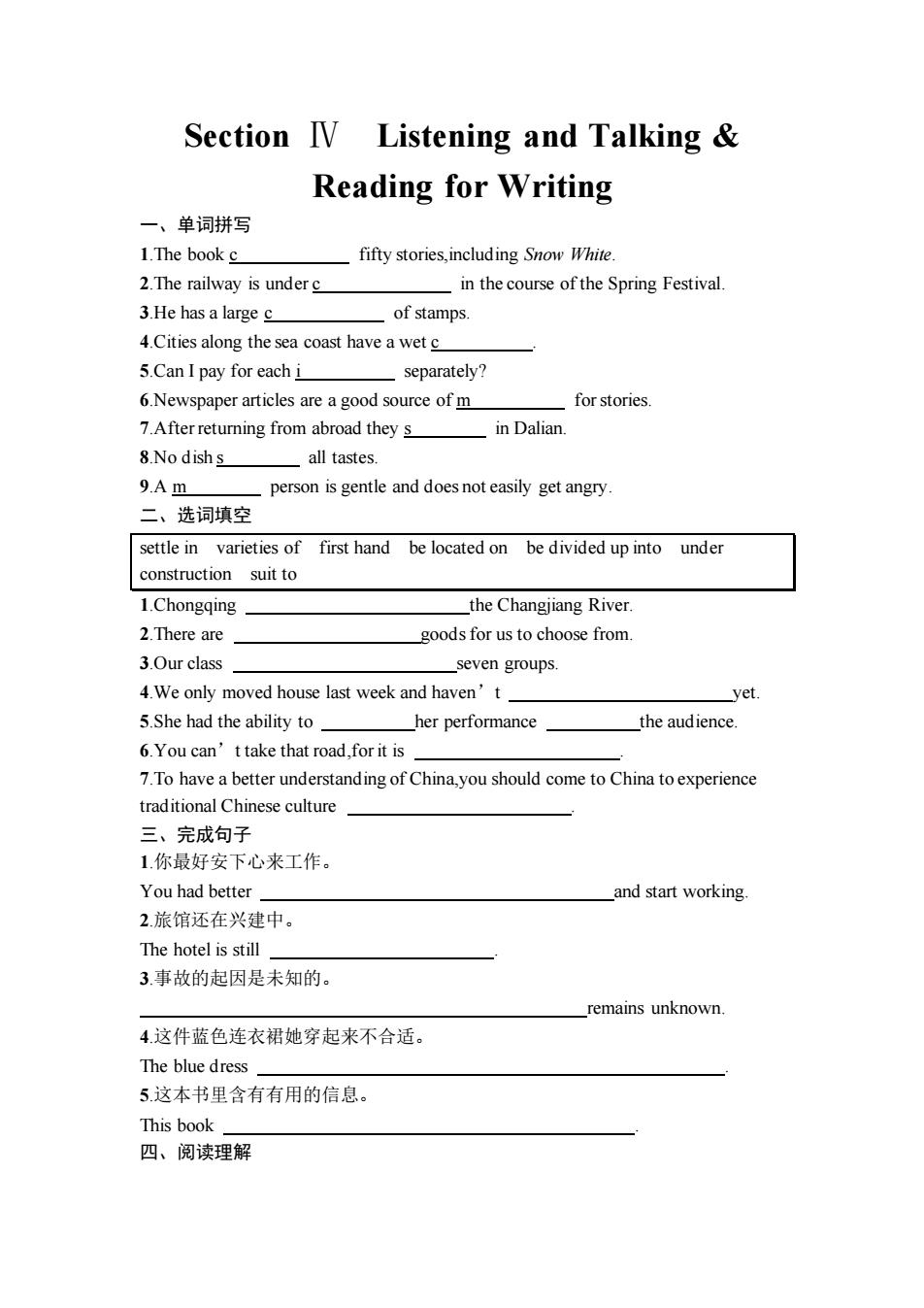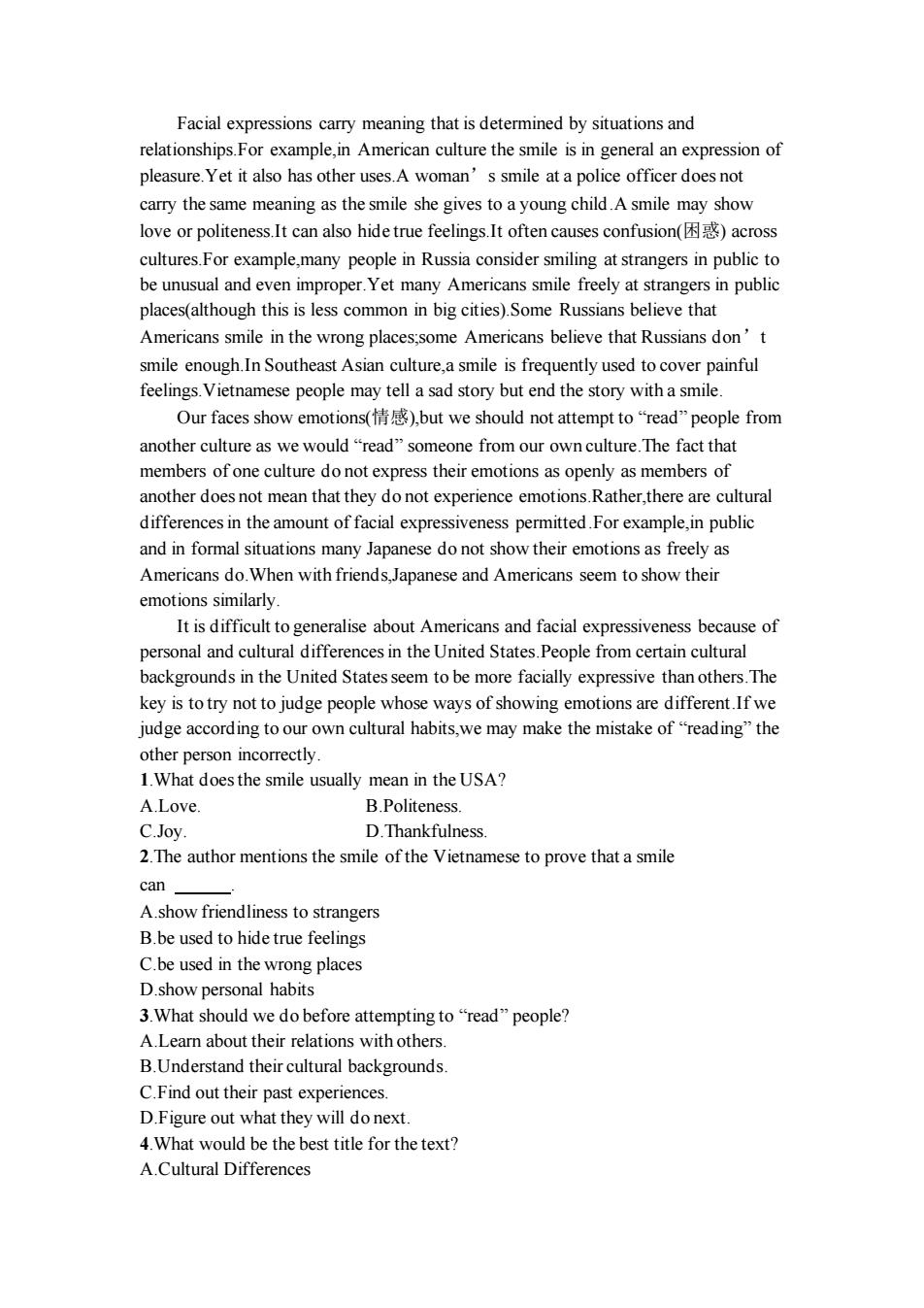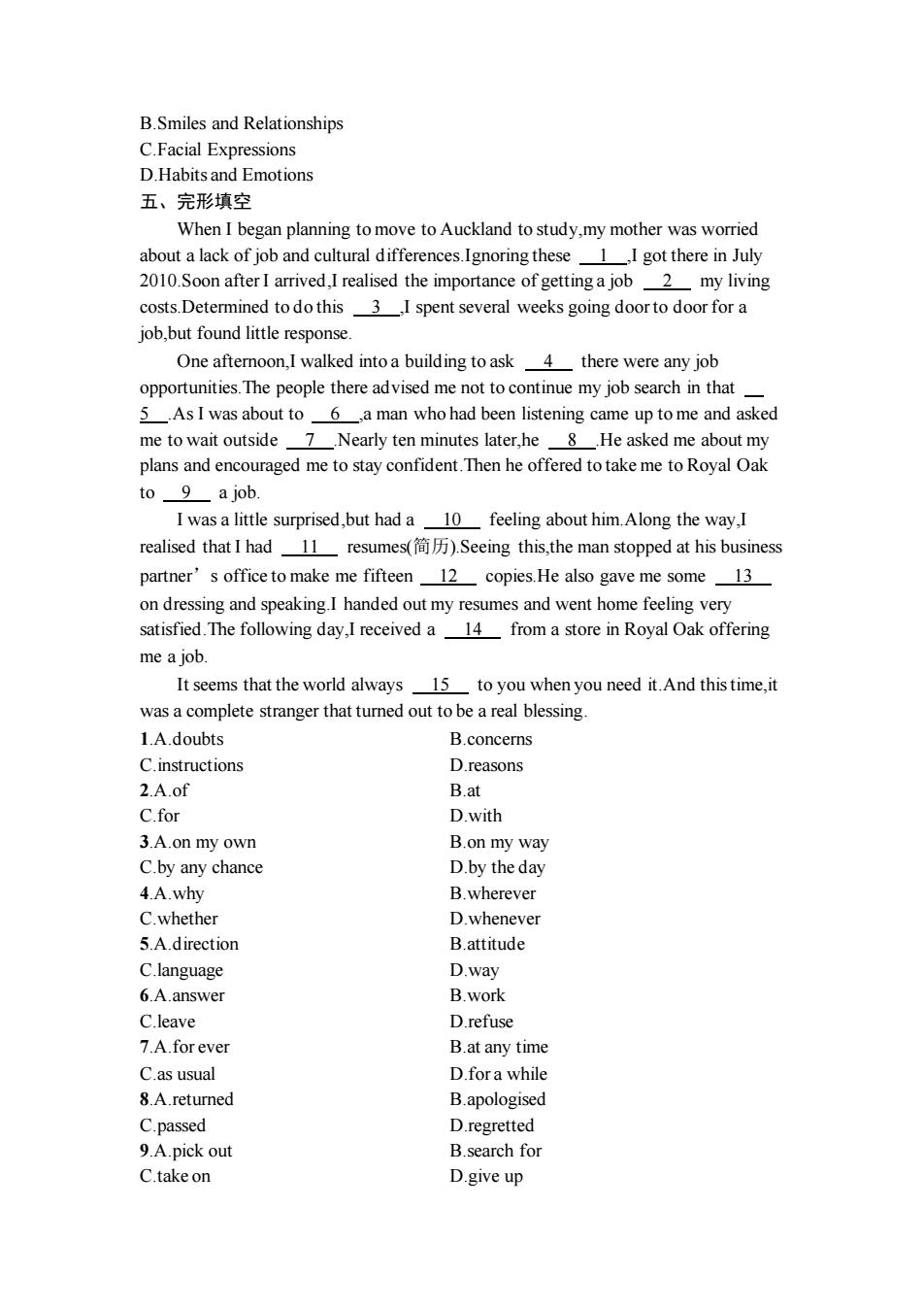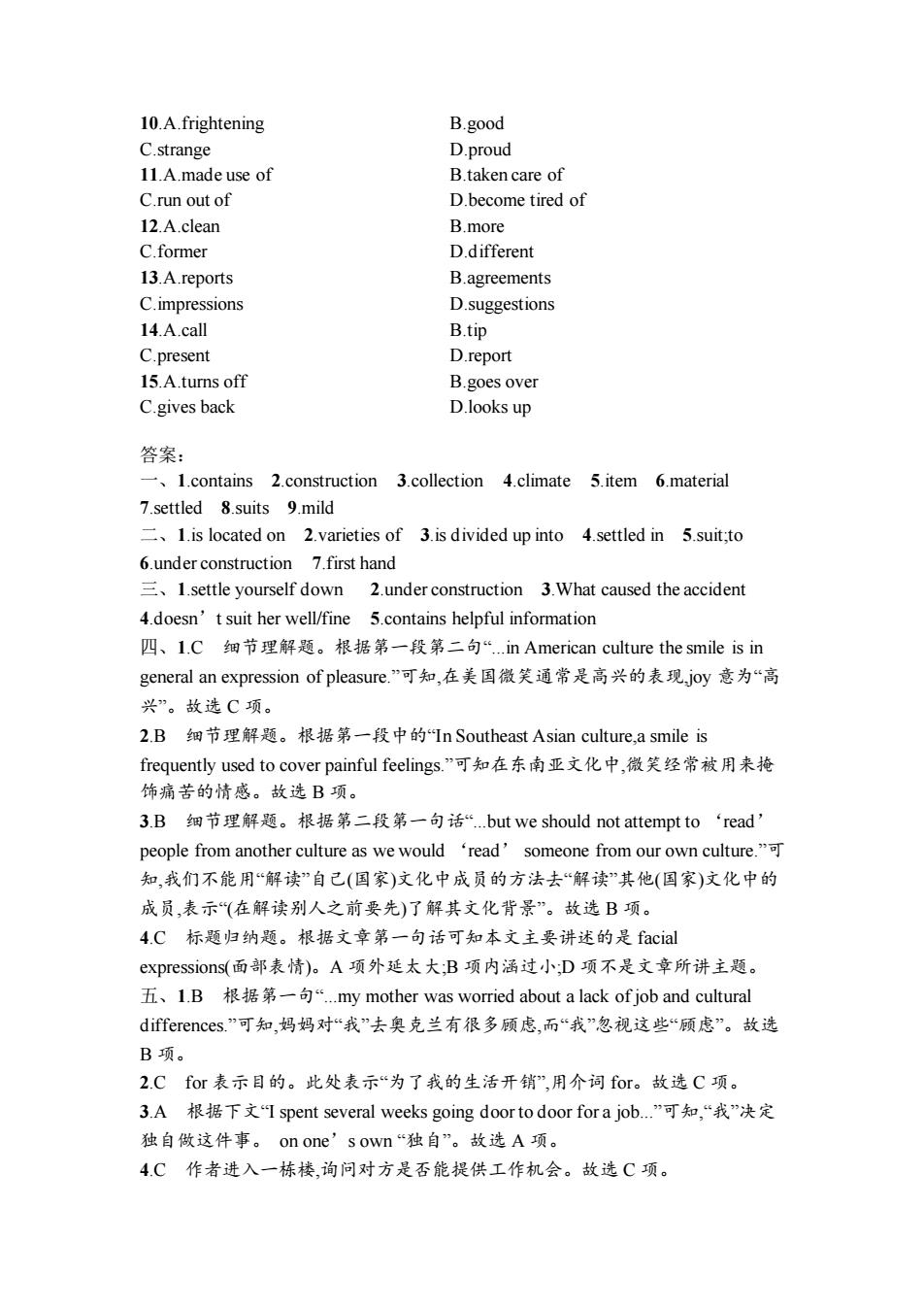
Section IV Listening and Talking Reading for Writing 一、单词拼写 1.The book c fifty stories,including Snow White. 2.The railway is under c in the course of the Spring Festival. 3.He has a large c of stamps. 4.Cities along the sea coast have a wet c 5.Can I pay for each i separately? 6.Newspaper articles are a good source of m for stories 7.After returning from abroad they s in Dalian 8.No dishs all tastes. 9.Am person is gentle and does not easily get angry. 二、选词填空 settle in varieties of first hand be located on be divided up into under construction suit to 1.Chongqing the Changjiang River. 2.There are goods for us to choose from. 3.Our class seven groups 4.We only moved house last week and haven't yet. 5.She had the ability to her performance the audience. 6.You can't take that road,for it is 7.To have a better understanding of China,you should come to China to experience traditional Chinese culture 三、完成句子 1你最好安下心来工作。 You had better and start working. 2.旅馆还在兴建中。 The hotel is still 3事故的起因是未知的。 remains unknown. 4.这件蓝色连衣裙她穿起来不合适。 The blue dress 5.这本书里含有有用的信息。 This book 四、阅读理解
Section Ⅳ Listening and Talking & Reading for Writing 一、单词拼写 1.The book c fifty stories,including Snow White. 2.The railway is under c in the course of the Spring Festival. 3.He has a large c of stamps. 4.Cities along the sea coast have a wet c . 5.Can I pay for each i separately? 6.Newspaper articles are a good source of m for stories. 7.After returning from abroad they s in Dalian. 8.No dish s all tastes. 9.A m person is gentle and does not easily get angry. 二、选词填空 settle in varieties of first hand be located on be divided up into under construction suit to 1.Chongqing the Changjiang River. 2.There are goods for us to choose from. 3.Our class seven groups. 4.We only moved house last week and haven’t yet. 5.She had the ability to her performance the audience. 6.You can’t take that road,for it is . 7.To have a better understanding of China,you should come to China to experience traditional Chinese culture . 三、完成句子 1.你最好安下心来工作。 You had better and start working. 2.旅馆还在兴建中。 The hotel is still . 3.事故的起因是未知的。 remains unknown. 4.这件蓝色连衣裙她穿起来不合适。 The blue dress . 5.这本书里含有有用的信息。 This book . 四、阅读理解

Facial expressions carry meaning that is determined by situations and relationships.For example,in American culture the smile is in general an expression of pleasure.Yet it also has other uses.A woman's smile at a police officer does not carry the same meaning as the smile she gives to a young child.A smile may show love or politeness.It can also hide true feelings.It often causes confusion()across cultures.For example,many people in Russia consider smiling at strangers in public to be unusual and even improper.Yet many Americans smile freely at strangers in public places(although this is less common in big cities).Some Russians believe that Americans smile in the wrong places;some Americans believe that Russians don't smile enough.In Southeast Asian culture,a smile is frequently used to cover painful feelings.Vietnamese people may tell a sad story but end the story with a smile Our faces show emotions(情感),but we should not attempt to“read'people from another culture as we would "read"someone from our own culture.The fact that members of one culture do not express their emotions as openly as members of another does not mean that they do not experience emotions.Rather,there are cultural differences in the amount of facial expressiveness permitted.For example,in public and in formal situations many Japanese do not show their emotions as freely as Americans do.When with friends,Japanese and Americans seem to show their emotions similarly. It is difficult to generalise about Americans and facial expressiveness because of personal and cultural differences in the United States.People from certain cultural backgrounds in the United States seem to be more facially expressive than others.The key is to try not to judge people whose ways of showing emotions are different.If we judge according to our own cultural habits,we may make the mistake of"reading"the other person incorrectly. 1.What does the smile usually mean in the USA? A.Love. B.Politeness. C.Joy. D.Thankfulness. 2.The author mentions the smile of the Vietnamese to prove that a smile can A.show friendliness to strangers B.be used to hide true feelings C.be used in the wrong places D.show personal habits 3.What should we do before attempting to"read"people? A.Learn about their relations with others. B.Understand their cultural backgrounds C.Find out their past experiences. D.Figure out what they will do next 4.What would be the best title for the text? A.Cultural Differences
Facial expressions carry meaning that is determined by situations and relationships.For example,in American culture the smile is in general an expression of pleasure.Yet it also has other uses.A woman’s smile at a police officer does not carry the same meaning as the smile she gives to a young child.A smile may show love or politeness.It can also hide true feelings.It often causes confusion(困惑) across cultures.For example,many people in Russia consider smiling at strangers in public to be unusual and even improper.Yet many Americans smile freely at strangers in public places(although this is less common in big cities).Some Russians believe that Americans smile in the wrong places;some Americans believe that Russians don’t smile enough.In Southeast Asian culture,a smile is frequently used to cover painful feelings.Vietnamese people may tell a sad story but end the story with a smile. Our faces show emotions(情感),but we should not attempt to “read” people from another culture as we would “read” someone from our own culture.The fact that members of one culture do not express their emotions as openly as members of another does not mean that they do not experience emotions.Rather,there are cultural differences in the amount of facial expressiveness permitted.For example,in public and in formal situations many Japanese do not show their emotions as freely as Americans do.When with friends,Japanese and Americans seem to show their emotions similarly. It is difficult to generalise about Americans and facial expressiveness because of personal and cultural differences in the United States.People from certain cultural backgrounds in the United States seem to be more facially expressive than others.The key is to try not to judge people whose ways of showing emotions are different.If we judge according to our own cultural habits,we may make the mistake of “reading” the other person incorrectly. 1.What does the smile usually mean in the USA? A.Love. B.Politeness. C.Joy. D.Thankfulness. 2.The author mentions the smile of the Vietnamese to prove that a smile can . A.show friendliness to strangers B.be used to hide true feelings C.be used in the wrong places D.show personal habits 3.What should we do before attempting to “read” people? A.Learn about their relations with others. B.Understand their cultural backgrounds. C.Find out their past experiences. D.Figure out what they will do next. 4.What would be the best title for the text? A.Cultural Differences

B.Smiles and Relationships C.Facial Expressions D.Habits and Emotions 五、完形填空 When I began planning to move to Auckland to study,my mother was worried about a lack of job and cultural differences.Ignoring these 1,I got there in July 2010.Soon after I arrived,I realised the importance of getting a job 2 my living costs.Determined to do this 3 I spent several weeks going door to door for a job,but found little response. One afternoon,I walked into a building to ask 4 there were any job opportunities.The people there advised me not to continue my job search in that 5.As I was about to 6 a man who had been listening came up to me and asked me to wait outside 7 Nearly ten minutes later,he 8 .He asked me about my plans and encouraged me to stay confident.Then he offered to take me to Royal Oak to 9 a job. I was a little surprised,but had a 10 feeling about him.Along the way,I realised that I had 11 resumes().Seeing this,the man stopped at his business partner's office to make me fifteen 12 copies.He also gave me some 13 on dressing and speaking.I handed out my resumes and went home feeling very satisfied.The following day,I received a 14 from a store in Royal Oak offering me a job. It seems that the world always 15 to you when you need it.And this time,it was a complete stranger that turned out to be a real blessing 1.A.doubts B.concerns C.instructions D.reasons 2.A.of B.at C.for D.with 3.A.on my own B.on my way C.by any chance D.by the day 4.A.why B.wherever C.whether D.whenever 5.A.direction B.attitude C.language D.way 6.A.answer B.work C.leave D.refuse 7.A.for ever B.at any time C.as usual D.for a while 8.A.returned B.apologised C.passed D.regretted 9.A.pick out B.search for C.take on D.give up
B.Smiles and Relationships C.Facial Expressions D.Habits and Emotions 五、完形填空 When I began planning to move to Auckland to study,my mother was worried about a lack of job and cultural differences.Ignoring these 1 ,I got there in July 2010.Soon after I arrived,I realised the importance of getting a job 2 my living costs.Determined to do this 3 ,I spent several weeks going door to door for a job,but found little response. One afternoon,I walked into a building to ask 4 there were any job opportunities.The people there advised me not to continue my job search in that 5 .As I was about to 6 ,a man who had been listening came up to me and asked me to wait outside 7 .Nearly ten minutes later,he 8 .He asked me about my plans and encouraged me to stay confident.Then he offered to take me to Royal Oak to 9 a job. I was a little surprised,but had a 10 feeling about him.Along the way,I realised that I had 11 resumes(简历).Seeing this,the man stopped at his business partner’s office to make me fifteen 12 copies.He also gave me some 13 on dressing and speaking.I handed out my resumes and went home feeling very satisfied.The following day,I received a 14 from a store in Royal Oak offering me a job. It seems that the world always 15 to you when you need it.And this time,it was a complete stranger that turned out to be a real blessing. 1.A.doubts B.concerns C.instructions D.reasons 2.A.of B.at C.for D.with 3.A.on my own B.on my way C.by any chance D.by the day 4.A.why B.wherever C.whether D.whenever 5.A.direction B.attitude C.language D.way 6.A.answer B.work C.leave D.refuse 7.A.for ever B.at any time C.as usual D.for a while 8.A.returned B.apologised C.passed D.regretted 9.A.pick out B.search for C.take on D.give up

10.A.frightening B.good C.strange D.proud 11.A.made use of B.taken care of C.run out of D.become tired of 12.A.clean B.more C.former D.different 13.A.reports B.agreements C.impressions D.suggestions 14.A.call B.tip C.present D.report 15.A.turns off B.goes over C.gives back D.looks up 答案: -1.contains 2.construction 3.collection 4.climate 5.item 6.material 7.settled 8.suits 9.mild 1.is located on 2.varieties of 3.is divided up into 4.settled in 5.suit;to 6.under construction 7.first hand 1.settle yourself down 2.under construction 3.What caused the accident 4.doesn't suit her well/fine 5.contains helpful information 四、l.C细节理解题。根据第一段第二句“.in American culture the smile is in general an expression of pleasure.”可知,在美国微笑通常是高兴的表现,joy意为“高 兴”。故选C项。 2.B细节理解题。根据第一段中的In Southeast Asian culture,a smile is frequently used to cover painful feelings.”可知在东南亚文化中,微笑经常被用来掩 饰痛苦的情感。故选B项。 3.B细节理解题。根据第二段第一句话“.but we should not attempt to‘read' people from another culture as we would read'someone from our own culture." 知,我们不能用“解读”自己(国家)文化中成员的方法去“解读”其他(国家)文化中的 成员,表示“(在解读别人之前要先)了解其文化背景”。故选B项。 4.C标题归纳题。根据文章第一句话可知本文主要讲述的是facial expressions((面部表情)。A项外延太大;B项内涵过小;D项不是文章所讲主题。 五、IB根据第一句“my mother was worried about a lack of job and cultural differences..”可知,妈妈对“我”去奥克兰有很多顾虑,而“我”忽视这些“顾虑”。故选 B项。 2.Cfor表示目的。此处表示“为了我的生活开销”,用介词for。故选C项。 3.A根据下文I spent several weeks going door to door for a job..”可知,“我”决定 独自做这件事。on one’sown“独自”。故选A项。 4.C作者进入一栋楼,询问对方是否能提供工作机会。故选C项
10.A.frightening B.good C.strange D.proud 11.A.made use of B.taken care of C.run out of D.become tired of 12.A.clean B.more C.former D.different 13.A.reports B.agreements C.impressions D.suggestions 14.A.call B.tip C.present D.report 15.A.turns off B.goes over C.gives back D.looks up 答案: 一、1.contains 2.construction 3.collection 4.climate 5.item 6.material 7.settled 8.suits 9.mild 二、1.is located on 2.varieties of 3.is divided up into 4.settled in 5.suit;to 6.under construction 7.first hand 三、1.settle yourself down 2.under construction 3.What caused the accident 4.doesn’t suit her well/fine 5.contains helpful information 四、1.C 细节理解题。根据第一段第二句“...in American culture the smile is in general an expression of pleasure.”可知,在美国微笑通常是高兴的表现,joy 意为“高 兴”。故选 C 项。 2.B 细节理解题。根据第一段中的“In Southeast Asian culture,a smile is frequently used to cover painful feelings.”可知在东南亚文化中,微笑经常被用来掩 饰痛苦的情感。故选 B 项。 3.B 细节理解题。根据第二段第一句话“...but we should not attempt to ‘read’ people from another culture as we would ‘read’ someone from our own culture.”可 知,我们不能用“解读”自己(国家)文化中成员的方法去“解读”其他(国家)文化中的 成员,表示“(在解读别人之前要先)了解其文化背景”。故选 B 项。 4.C 标题归纳题。根据文章第一句话可知本文主要讲述的是 facial expressions(面部表情)。A 项外延太大;B 项内涵过小;D 项不是文章所讲主题。 五、1.B 根据第一句“...my mother was worried about a lack of job and cultural differences.”可知,妈妈对“我”去奥克兰有很多顾虑,而“我”忽视这些“顾虑”。故选 B 项。 2.C for 表示目的。此处表示“为了我的生活开销”,用介词 for。故选 C 项。 3.A 根据下文“I spent several weeks going door to door for a job...”可知,“我”决定 独自做这件事。 on one’s own “独自”。故选 A 项。 4.C 作者进入一栋楼,询问对方是否能提供工作机会。故选 C 项

5.D此处表示那里的人建议“我”不要用那种方式找工作。in that way表示“用那 种方式”。故选D项。 6.C此处表示正当“我”准备离开时,有人让“我”稍等一会儿。answer“回 答”,work“工作”,leave“离开”,refuse“拒绝”。故选C项。 7.D根据下文Nearly ten minutes later,he..”可知,这里是说他让“我”在门口等一 会儿。for ever“永远”;at any time“随时,无论何时”;as usual和平时一样”,fora while“一会儿”。故选D项。 8A根据上文可知“我”正要离开,他让“我”等一会儿,大约十分钟后他回来了,然 后带着“我”去了Royal Oak找工作。故选A项。 9.B由下文可知他带“我”去Royal Oak是去找工作的。search for“寻找,搜 寻”pick out“挑选,认出”,take on“呈现,承担”give up“放弃”。故选B项。 10B一个素不相识的陌生人,主动带“我”去找工作,虽然“我”有些惊讶,但是对他 还是有一个很好的印象。have a good feeling about sb“对某人有很好的印象”。故 选B项。 11.C根据下文提到的他在他同伴的办公室里为“我”复印了15份简历,可以推断 “我”已经把简历用光了。make use of“利用”,take care of“照顾”,run out of用 光”,become tired of对…厌倦”。故选C项。 12.B数词放在more前面,表示“再,又”。因为“我”之前有简历,他又给“我”复印 了l5份,可以说是fifteen more copies.。故选B项。 13.D此处指他除了带“我”去Royal Oak找工作,为“我”复印简历,还就着装和言 语表达给了“我”一些建议。故选D项。 14.A根据下文及语境可知,“我”接到一个给“我”提供工作的电话。故选A项。 15.C此处表示当你需要这个世界的时候,世界就会回应你。turn off关闭”g0 over“复习”give back“回应”,look up“查找”。故选C项
5.D 此处表示那里的人建议“我”不要用那种方式找工作。in that way 表示“用那 种方式”。故选 D 项。 6.C 此处表示正当“我”准备离开时,有人让“我”稍等一会儿。answer“回 答”;work“工作”;leave“离开”;refuse“拒绝”。故选 C 项。 7.D 根据下文“Nearly ten minutes later,he...”可知,这里是说他让“我”在门口等一 会儿。for ever“永远”;at any time“随时,无论何时”;as usual“和平时一样”;for a while“一会儿”。故选 D 项。 8.A 根据上文可知“我”正要离开,他让“我”等一会儿,大约十分钟后他回来了,然 后带着“我”去了 Royal Oak 找工作。故选 A 项。 9.B 由下文可知他带“我”去 Royal Oak 是去找工作的。 search for“寻找,搜 寻”;pick out“挑选,认出”; take on“呈现,承担”;give up“放弃”。故选 B 项。 10.B 一个素不相识的陌生人,主动带“我”去找工作,虽然“我”有些惊讶,但是对他 还是有一个很好的印象。have a good feeling about sb “对某人有很好的印象”。故 选 B 项。 11.C 根据下文提到的他在他同伴的办公室里为“我”复印了 15 份简历,可以推断 “我”已经把简历用光了。make use of“利用”;take care of“照顾”;run out of“用 光”;become tired of“对……厌倦”。故选 C 项。 12.B 数词放在 more 前面,表示“再,又”。因为“我”之前有简历,他又给“我”复印 了 15 份,可以说是 fifteen more copies。故选 B 项。 13.D 此处指他除了带“我”去 Royal Oak 找工作,为“我”复印简历,还就着装和言 语表达给了“我”一些建议。故选 D 项。 14.A 根据下文及语境可知,“我”接到一个给“我”提供工作的电话。故选 A 项。 15.C 此处表示当你需要这个世界的时候,世界就会回应你。turn off“关闭”;go over“复习”;give back“回应”;look up“查找”。故选 C 项